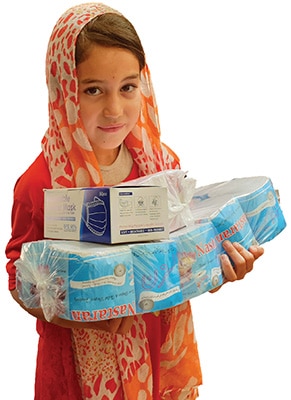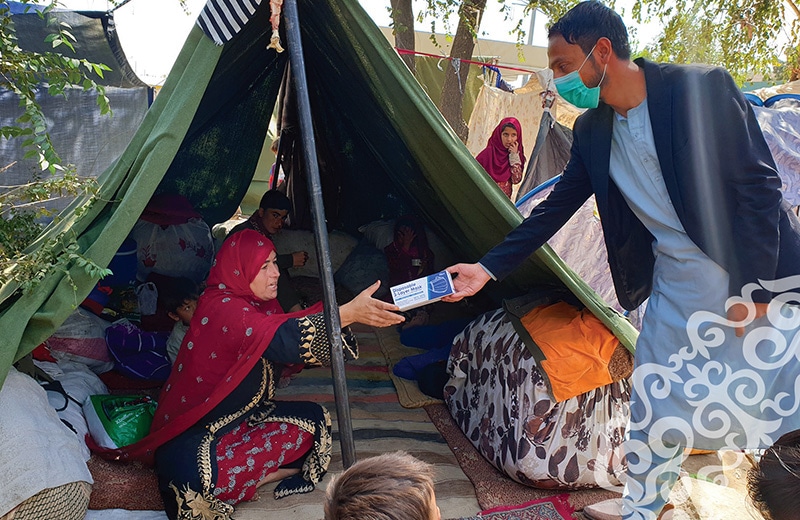Fighting the new, nameless war in Afghanistan
When the Taliban retook control of Afghanistan in August 2021, 20 years after their expulsion by U.S. troops, the American War ended. During those two decades of war, 200,000 Afghans tragically lost their lives. But now, a potentially more dangerous war is brewing. This nameless war has no clear enemy. Instead, it is a battle of survival for the Afghan people.
Throughout the spring and summer of 2021, a third wave of COVID spread across the country like wildfire. With limited ways to protect themselves, a lack of understanding about the virus, and virtually no access to the vaccine to prevent it, countless Afghans succumbed to illness and death. When the Taliban seized power in August, the battle for survival intensified.
Government services and international aid have all but ceased leaving Afghanistan’s economy on the verge of collapse. Only 5% of households report they have enough food to eat, and with winter fast approaching, the outlook is grim. Most at risk are more than 400,000 women and children who have been displaced since the beginning of 2021. Penniless, homeless, and with no way to support themselves, they are on the frontlines of this new, nameless war.
Of the approximate 550,000 Afghans displaced in 2021, about 80% are women and children.
Together, we’re helping the most vulnerable Afghans
Thanks to your generous support, to date, Central Asia Institute has helped thousands of the most vulnerable Afghans. To combat the spread of COVID, you’ve helped provide:

- 15,186 facemasks
- 12,240 handwashing stations
- 1,845 hygiene kits
- Medicines and soap for 1,170 people
- 1,385 free medical exams
In addition, women-led families and female students in Takhar and Kapisa provinces benefited from 13,700 handwashing stations and 12,160 facemask kits. And loudspeaker messages about COVID-19 were broadcast in camps for displaced people to decrease infection rates and encourage social distancing and proper hygiene.
More help is on the way
Around 18 million Afghans, almost half the population, are now in urgent need of humanitarian assistance, according to the International Federation of Red Cross and Red Crescent Societies. Unfortunately, the need will likely increase.
At Central Asia Institute, we’re doing everything in our power to assist communities affected by the crisis. In the coming weeks, we’re planning to distribute an additional 300 bedding kits (blankets, tarps for shelter, etc.), 300 hygiene kits (soap, menstrual hygiene products, etc.), and 300 education kits (books, pencils, etc.) to displaced families.
Nearly 18 million Afghans, almost half the population, are in urgent need of humanitarian assistance.

Aisha, a victim of this new war
The crisis in Afghanistan cannot be explained through statistics alone. Hearing from people like Aisha, whose heartfelt letter opened the Journey of Hope magazine, is the best way to understand the situation. So we thought it was only right for her words to close the magazine as well.
Hello and salam (peace) to the world. My name is Aisha, and I’m 21 years old. I am one of the displaced people who fled from Kapisa to Kabul. By the time I am writing this, the Taliban have captured Afghanistan—my country! Now girls are being forced into marriage, female workers marched away from their jobs, and activists' homes raided in a clear message that the freedoms of the last 20 years are coming to an end. I'm worried about my future. I won't be allowed to get an education, work, go outside, or live the life I want. I feel like I am in prison without having committed a crime. For this new generation of Afghan girls, who grew up going to school and nurturing unfettered dreams, the Taliban era is ancient history, and turning back the clock is a nearly incomprehensible fate. Please, do not leave us alone. We have not forgotten the help that other countries offered us in the past, and we will not forget any help you offer us now. Please release us from this prison. Please help my people. Please help Afghanistan!
- Aisha
The situation in Afghanistan is changing rapidly. Please visit centralasiainstitute.org for the most up-to-date information about what’s happening on the ground and our efforts to support the Afghan people.

